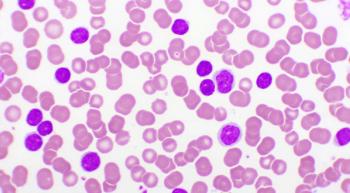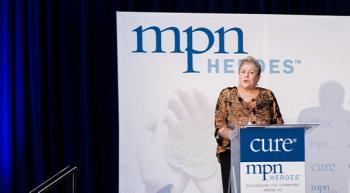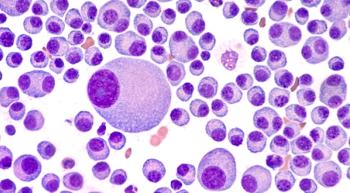Articles by Beth Fand Incollingo

There is no approved treatment that targets the KRAS p.G12C mutation that drives some cancers like non-small cell lung cancer. But a recent study shows how the experimental drug sotorasib sparked responses in some patients with advanced non-small cell lung cancer that harbored the mutation.

At a virtual event Sept. 17, CURE® also named Elizabeth Farrat, B.S.N., RN, CCRN-K, the winner of its first-ever Finest Hour Award for selfless achievements in care during the COVID-19 pandemic.

A proposed preventive surgery that would take out fallopian tubes before menopause but save ovary removal until afterwards was favored by most premenopausal previvors of ovarian cancer in a study.

Adding Venclexta to Vidaza chemotherapy improved survival and boosted the complete remission rate in previously untreated patients with AML who had coexisting health conditions and/or were age 75 or older, results from a phase 3 clinical trial showed.

Immediate treatment with Lynparza after standard surgery and chemotherapy should be considered for all patients with newly diagnosed stage 3 or 4 ovarian cancer that carries a BRCA gene mutation, even if residual disease remains, researchers have found.

Heightening the dose of the targeted drug Rituxan (rituximab) during the first four cycles of the R-CHOP regimen does not improve outcomes in treating patients with diffuse large B-cell lymphoma, the phase 3 HOVON-84 trial found.

The FDA has approved a generic form of the intravenous chemotherapy pemetrexed for use by itself in patients with locally advanced or metastatic non-squamous non-small cell lung cancer that has not progressed following four cycles of initial platinum-based chemotherapy.

After lifesaving medicine became available to treat hepatitis C virus, a risk factor for liver cancer, racial inequities in the death rate from the malignancy began a steady upward climb.

A clinical trial of Brukinsa (zanubrutinib) is open to patients with B-cell blood cancers and will determine whether the side effects re-emerge with Brukinsa.

CancerCare unveils its new online support for members of the LGBTQ+ community who also have cancer.

Scalp cooling can safely preserve hair for some patients who are undergoing chemotherapy, and experts want to make the technology more widely available.

The results of an ongoing study designed to reveal genetic characteristics linked with the development of cholangiocarcinoma could pave the way for more accurate prognoses, as well as new treatments.

A survey administered by pharmaceutical company Incyte and the nonprofit Cholangiocarcinoma Foundation found that patients with bile duct cancer face more than a dozen symptoms or treatment-related side effects that negatively affect their daily lives.

There’s no foolproof way to prevent cancer or its recurrence, but following certain strategies, such as the expert-recommended advice here, can reduce risk.

In this episode of the “CURE Talks Cancer” podcast, we spoke with breast cancer specialist Dr. Julie Nangia about the increase of popularity in the use of devices known as cold caps to help patients with solid tumors receiving treatment for their disease keep more of their hair from falling out.

The Multiple Myeloma Research Foundation’s newly launched CureCloud is a registry designed to collect clinical and genomic information about patients. Its goals are to help researchers discover treatments for various subtypes of the disease and let patients know whether they have any of 70 genetic aberrations associated with myeloma.

For survivor Michele Grimes, time at home during the pandemic fosters an opportunity for reflection and growth.

Keytruda bested chemotherapy, delaying disease progression or death by 40%, in a clinical trial that led to the drug’s approval for use as a single initial treatment for patients with colorectal cancer.

In its first virtual performance, the Visible Ink writing therapy program at Memorial Sloan Kettering Cancer Center shared works by patients and staff members that touched on the COVID-19 pandemic and were interpreted by celebrity actors, singers and dancers.

A new tool analyzes patterns of RNA expressed from genes, pinpointing more patients with cancer who can benefit from immunotherapies and targeted drugs.

Immunotherapy could help a segment of patients with metastatic prostate cancer, a study found.

“Anyone who met my mother was touched by her spirit. She challenged people to be curious, to seek more, to learn more and to challenge themselves,” LaTour’s daughter, Kirtley Perkins, wrote on Facebook.

One survivor has advice for others affected by both cancer and the COVID-19 pandemic: Accept your limitations.

The addition of the novel drug Xpovio to the regimen of Velcade and dexamethasone delayed disease progression, reduced peripheral neuropathy and required fewer office visits in a study of previously treated patients with multiple myeloma.

The immunotherapy Bavencio improves survival when given as a maintenance treatment in patients whose advanced urothelial carcinoma did not progress on platinum-based chemotherapy.

One survivor makes the most of the time in the infusion chair, creating beaded jewelry and helping herself and others to heal.

Dr. Wendy S. Harpham’s e-book “Finding Hope That Heals” looks to help patients with cancer craft, and achieve, attainable goals on their cancer journey.

As the risk of colorectal cancer grows among those under 50, younger adults should know more about signs and screening.

The Food and Drug Administration gave the green light to the PARP inhibitor Lynparza for men with metastatic castration-resistant prostate cancer that has a defective DNA-repair process and has progressed after treatment with the novel hormone-controlling drugs Xtandi (enzalutamide) or Zytiga (abiraterone acetate).

CURE® remembers the life and work of Patrice “Patti” Hennessy patient advocate and loving grandmother, who passed away from cancer on January 28th.




















